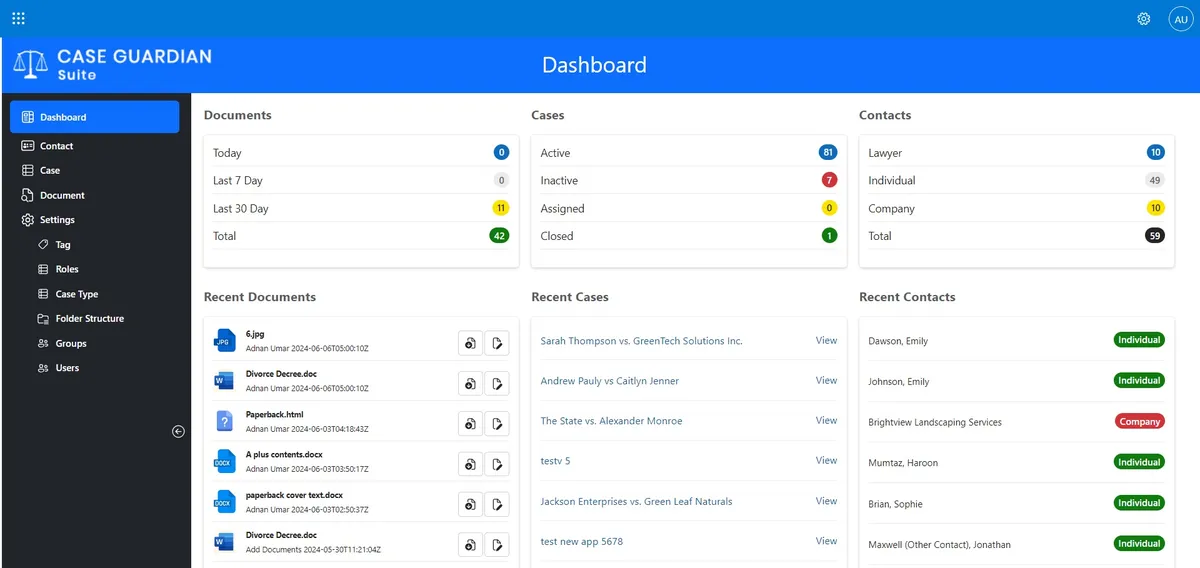As a seasoned SharePoint architect, I’ve witnessed the evolution of legal document management firsthand. Gone are the days of overflowing filing cabinets and frantic searches for critical case files.
Today, law firms are embracing the cloud-based nirvana of Microsoft SharePoint, transforming document management from a logistical nightmare to a streamlined symphony of organization and accessibility.
Remember the days of scrambling to locate that crucial document buried deep within a labyrinthine file structure?
With SharePoint, those frantic searches are a thing of the past.
Here’s why legal minds across the globe are singing the praises of SharePoint:
- Centralized Legal Hub: SharePoint offers a single, secure platform for storing and organizing all your legal documents, ensuring everything is accessible to authorized users from anywhere, at any time. Say goodbye to scattered files and hello to a unified document repository.
- Enhanced Collaboration: Streamline teamwork on cases with features like co-authoring, version control, and real-time document updates. No more emailing document revisions back and forth – everyone’s on the same page, literally.
- Robust Security: SharePoint boasts robust security features, allowing you to control access to documents based on user roles and permission levels. Sensitive client information remains protected, ensuring compliance with legal and ethical requirements.
- Seamless Integration: SharePoint integrates seamlessly with familiar Microsoft Office products like Word and Excel, eliminating file conversion hassles and simplifying document creation and editing within the platform.
- Scalability on Autopilot: As your firm grows, SharePoint scales effortlessly to accommodate your expanding document needs. No more worrying about running out of physical storage space – the cloud is your limitless vault.
These are just a few of the reasons why SharePoint has become the go-to platform for legal document management. But how exactly can you leverage SharePoint’s capabilities to organize your law firm’s case documents?
Let’s delve into the specifics.
SharePoint: A Feature-Rich Arsenal for Law Firms
SharePoint offers a plethora of features specifically tailored to streamline legal document management.
Here are some of the key functionalities:
- Metadata Management: Categorize and organize documents using metadata, such as client name, case type, and date. Imagine finding any document in seconds with a few clicks!
- Retention Policies: Implement automated document retention policies to ensure compliance with legal regulations and free up storage space for active cases.
- eDiscovery: Simplify the eDiscovery process with built-in search capabilities that allow you to quickly locate relevant documents based on specific keywords and criteria.
- Workflow Automation: Automate repetitive tasks like document routing for approvals or client onboarding processes, saving valuable time and minimizing errors.
- Mobile Access: Access your documents and collaborate with colleagues from any device, whether you’re at the office, in court, or meeting a client at their location.
Putting SharePoint to Work: Use Cases for Law Firms
Now, let’s see how SharePoint can be applied in various law firm scenarios:
- Mergers and Acquisitions: Create a secure workspace for sharing confidential documents and collaborating with opposing counsel during mergers and acquisitions.
- Litigation Management: Organize all case documents related to litigation, including pleadings, motions, and evidence, in a centralized and easily accessible location.
- Intellectual Property Protection: Securely store and manage intellectual property documents like patents, trademarks, and copyrights, ensuring proper access controls for authorized personnel.
- Client Communication: Share documents securely with clients within a dedicated client portal, fostering collaboration and transparency throughout the legal process.
- Knowledge Management: Create a central repository for legal precedents, case studies, and internal knowledge documents for easy reference by all attorneys within the firm.
Organizing Client Cases: A SharePoint Odyssey
SharePoint offers various options to organize your client cases, allowing you to choose the approach that best suits your firm’s structure and document management preferences. Here are a few popular methods:
- Organize client cases using Folders: Create a hierarchical folder structure based on client name, case type, or any other relevant categorization scheme. This is a simple and familiar approach, but it can become cumbersome for complex cases with numerous documents.
- Organize client cases using SharePoint sites: This method allows you to create a dedicated SharePoint site for each client, providing a secure and isolated workspace for all case-related documents and communications.
- Organize client cases using Office 365 Groups: Leverage Office 365 Groups to create collaborative workspaces that include a SharePoint site, document library, and email functionality for each client case.
- Organize client cases using Document Sets: This feature allows you to group related documents logically (e.g., pleadings, discovery documents, briefs)
within a single library, maintaining a clear hierarchy and simplifying document management for complex cases.
SharePoint With Cloud: Embracing the Azure Advantage
SharePoint Online, the cloud-based version of SharePoint, offers several distinct advantages for law firms:
- Accessibility Anywhere, Anytime: Your team can access documents and collaborate on cases from anywhere with an internet connection, eliminating geographical limitations and fostering remote work capabilities.
- Reduced IT Overhead: Microsoft handles the infrastructure and maintenance of SharePoint Online, freeing your IT team to focus on more strategic initiatives.
- Enhanced Security: Microsoft Azure, the underlying cloud platform for SharePoint Online, boasts robust security features and compliance certifications, ensuring the highest level of data protection for your sensitive legal documents.
- Automatic Updates: Benefit from automatic software updates and security patches, ensuring you’re always working with the latest and most secure version of SharePoint.
- Cost-Effectiveness: Pay-as-you-go subscription pricing for SharePoint Online makes it a scalable and cost-effective solution for law firms of all sizes.
Getting Started with SharePoint: A Beginner’s Guide
Ready to embark on your SharePoint journey?
Here’s a roadmap to get you started:
- Assess Your Needs: Identify your document management challenges and define your desired functionalities within SharePoint.
- Choose the Right Version: Decide between SharePoint Server (on-premises) or SharePoint Online (cloud-based) based on your infrastructure and security preferences.
- Develop a Document Management Strategy: Define your document organization structure, access control policies, and user training procedures.
- Migrate Existing Documents: Develop a plan to migrate your existing legal documents into SharePoint while maintaining a clear audit trail.
- Customize and Configure: Leverage SharePoint’s customization options to tailor the platform to your firm’s specific workflows and needs.
Remember, this is just the springboard to your SharePoint success. As your needs evolve, you can explore advanced features like workflows, eDiscovery, and integration with other Microsoft solutions.
Beyond the Basics: Maintaining, Creating, Documenting
Maintaining a well-organized SharePoint document library is an ongoing process.
Here are some key aspects to consider:
- Maintaining Document Libraries: Regularly review and declutter your document libraries, archiving inactive documents according to your retention policies.
- Creating Workflows: Automate repetitive tasks like document routing for approvals or client onboarding processes, saving valuable time and minimizing errors.
- Documenting Processes: Create clear and concise documentation for your SharePoint setup to ensure all users understand how to navigate the platform and access relevant documents.
How we’re helping law firms to manage and organize case documents in SharePoint
One category of clients I help configure SharePoint for are law firms. SharePoint makes perfect sense for the legal industry, as it allows to easily store documents in the cloud and be able to access them from outside of the office (i.e., courtroom).

Additional SharePoint features, like versioning and metadata, allow for a very robust management of legal documents, court or client correspondence.
I think you have worked with many attorneys in your life who helped you with life’s various legal battles, so you’re very familiar with their lifestyles and processes.
I would like to check one particular case portal for legal firms, CaseGuardian Suite, which stands as a beacon of innovation for law firms.
By harnessing the power of SharePoint and OneDrive, integrated closely with ActionStep, it offers a robust document management system that seamlessly aligns with your existing workflows.
Our solution enables law firms to manage cases, documents, and contacts effortlessly, without needing to migrate to a new system. Since this is the only time when I talk to an attorney and they have to pay me for services, and not the other way around. 🙂
When Expertise Matters: Partnering with a SharePoint Team
While SharePoint offers a powerful platform for legal document management, navigating the intricacies of configuration, customization, and data migration can be complex.
Here’s the truth: partnering with a team of SharePoint experts is your smartest move.
An experienced SharePoint team can help you:
- Customize Workflows: Develop custom workflows that automate specific tasks within your law firm’s case management processes.
- Data Migration and Security: Ensure a smooth and secure migration of your existing legal documents into SharePoint, implementing robust security protocols for data protection.
- Integration with Legal Software: Integrate SharePoint with your existing legal practice management software for a seamless and centralized document management experience.
By partnering with our SharePoint experts, you can unlock the full potential of this platform and transform your law firm’s document management into a well-oiled machine.
With increased accessibility, streamlined workflows, and robust security, SharePoint can empower your legal team to focus on what matters most: winning cases for your clients.



